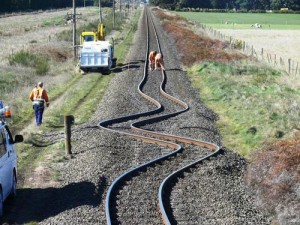Earthquakes in New Zealand
As New Zealand and other areas in the Pacific Ocean passed the May 21, 6 p.m. local time unscathed, despite predictions by Harold Camping that the hour would signal the beginning of the end of the world, many seemed to breathe a public sigh of relief – some tongue-in-cheek and others more seriously – on Twitter and other social media forums.
Although it was not the first time Oakland-based Camping (89) forecast the apocalypse, this date marked the most attention-grabbing of his doomsday predictions. The unprecedented publicity was spurred by a worldwide $100-million campaign of caravans and billboards, financed by the sale and swap of TV and radio stations.
Camping broadcast what he told viewers would be his final ‘Open Forum’ TV and radio show Thursday night. The Times’ Christopher Goffard reported that when Camping, a former engineer, wrapped up the program he’s hosted for decades, he shook hands with a couple of crewmen. “I probably won’t see you again” – he announced.
The map above shows recent seismic activity in the world, as reported by the U.S. Geological Survey on Saturday morning, shortly after midnight in Los Angeles.
Below is a look at what people were saying as the predicted start of the apocalypse came and went.
Harold Camping’s prediction of doomsday beginning on May 21 has proven to be wrong.
The self-styled prophet predicted the end of the world would begin in New Zealand at 6 p.m. local time, but the destruction has failed to materialize. Camping claimed a single massive earthquake would begin in New Zealand, and it would travel around the world to San Francisco at 6 p.m. on Saturday.
The University of Washington’s John Vidale says Camping’s prediction of a single earthquake ending humanity is not feasible. Vidale believes that a magnitude 10 earthquake would have to break a subduction zone to create massive destruction, but the worst case scenario would be located off of a coastline and not under a city.
Although an entire coastline would be ruined by tsunamis in Vidale’s scenario, the earthquake would not wipe out all of humanity.
Camping is an 89-year-old who taught himself how to interpret the Bible. His prediction was based upon his own research. Although Camping may have some followers, his own children and grandchildren refused to believe in his May 21 prediction. Only his wife offered her support.
Camping has not made a public comment since New Zealand survived his predicted doomsday time.
Nothing is as it was before Feb. 22. Sport, sadly for many, is no exception.
Facilities, especially on the eastern side of the city, were hit hard in the quake, displacing teams and whole sporting organisations.
QEII is munted. It’s unclear when, or even if, it will be rebuilt.
Porritt Park is the same.
A decision is still to be made on its future. Tennis’s Wilding Park will be saved despite massive damage.
However, all sports have been affected in one way or another.
QEII was developing as not just the home for swimming and athletics, but as a crucial sporting hub. Canterbury Cricket used the Village Green as a home ground, gymnastics had its home on site as did the New Zealand Academy of Sport.
Academy acting chief executive Selwyn Maister told The Press that QEII was becoming the premier sporting venue in the country.
“Bar none” – he said. “It had investment from the council and Sparc were lining up too. That’s what makes this such a shame.”
But, as they say, the show must go on.
The academy is now based at Pioneer Stadium, but it doesn’t have all of its high-performance goodies.
Some staff and athletes have moved to the Dunedin academy base while many individual programmes have been drastically altered.
“We’re doing what we can to make it work” – Maister said.
